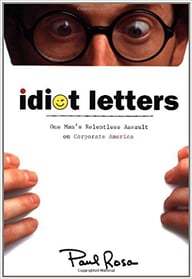5 Words That Make Your Content Marketing Sound Dumb

Yesterday I read a corporate vision statement from a major, well-known organization. Their mission? To “exceed expectations.” No joke. I think I audibly groaned.
I’ve written in the past about the need for clarity in content marketing. And yet I’m continually astounded by people who fool themselves into thinking fancy words sound better.
In fact, one of my favorite books of all time, Idiot Letters, explores this in hysterical detail.
It all started when author Paul Rosa received a patronizing letter from a well-known pizza chain reassuring Paul that he was the sort of customer the pizza maker wanted to see more of.
“What kind of customer,” he wondered, “wouldn’t you like to see more often?” So he launched a one-man campaign to uncover some of the most inane marketing-speak the world has ever known.
The result is a book that will make your sides hurt you’ll be laughing so hard. I highly recommend it.
In honor of this outstanding work of literature, here are five of my favorite (or should I say least favorite?) word choices that make even smart marketing communications look dumb.
“Exceed expectations.” Sounds great. But what does it mean? As a customer, I don’t want to have to figure out what you mean. I don’t have that kind of time, and I don’t really care, anyway. So if what you mean by “exceeding expectations” is that you’re going to give me a higher quality product, with more features, at a lower price, THEN SAY SO! “Exceeding expectations” tells me nothing. Be precise. Don’t waste my time.
“Customer focused.”
Steve Tobak of Inc. Magazine recently opined, “Talk about redundant. Should you be anything but customer focused?” He goes on to say that if you’re trying to imply that other providers are not customer focused, or that you’re better or faster or more responsive or more customized, then “Tell me in concrete terms how you will meet my specific needs.” And if you don’t know my needs and therefore can’t be more specific, then shame on you. Well put, Steve. Well put.
Related Content: Personal Branding Strategies for Consultants
“Very.”
If you have to put the word “very” in front of an adjective or adverb, then you’re not thinking hard enough. Is there a more powerful word you can use instead? “She spoke very loudly” can become “She shouted.” “We are very excited” becomes “We are thrilled.” And so forth. You may also find that “very” is like being “a little pregnant”; you either are or you aren’t. So don’t tell me you’re “very responsive.” You’re either responsive or you’re not. Same goes for “very dedicated” and “very effective.” It’s an easy mistake to fall into – but trust me, resist the temptation. You’ll thank me eventually.
“Stuff.”
This one comes to me from colleague Paul Feith, owner of marketing firm Paul Gregory Media. He says, “I hate that word in speaking and writing. George Carlin made a whole routine with that word, but it’s such a vague and juvenile word. Replacing it with any other word is usually an improvement. For example: ‘Here’s all the stuff you can put on a web page.’ What stuff? How about, ‘Here are all the acceptable HTML elements you can put on a web page.’” In other words, be precise! (By the way, click here to see Carlin’s riff on “stuff.” Classic.)
“Simply.”
Another word Paul hates, and I agree. As Paul explains, just because an action is simple to the writer doesn’t mean it’s simple to the reader. That’s how you end up with gobbledygook like, “Simply calculate the trajectory as it relates to the friction coefficient on the z-tangent.” Yeah, right. Paul also tries to avoid using that word when describing a marketing term or process to a client, because if the client doesn’t understand it, he or she feels stupid … because it was supposed to be simple. Never making a client feel stupid seems to be a pretty good idea, so follow Paul’s advice and avoid using the word “simply”.I wish I could say I’ve never used any of these words, but I’m sure that would be a lie. Still, I’m trying. The sadder thing is that we’re only scraping the tip of this iceberg.
Undoubtedly, you have your own favorite words you love to hate. Tell me about them: What words do you wish marketers would stop using, and why?
P.S. As a final wrap up, here is George Carlin’s unique take on everyday expressions. Enjoy!





